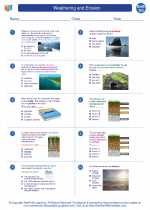Carbon Dioxide
Carbon dioxide (CO2) is a chemical compound composed of two oxygen atoms covalently bonded to a single carbon atom. It is a colorless and odorless gas that is naturally present in the Earth's atmosphere. Carbon dioxide is produced by various natural processes such as respiration in animals and plants, volcanic eruptions, and the decay of organic matter. Additionally, it is also a byproduct of human activities such as burning fossil fuels, deforestation, and industrial processes.
Properties of Carbon Dioxide
Some important properties of carbon dioxide include:
- Physical State: At standard temperature and pressure, carbon dioxide exists as a gas. It can also exist as a solid (dry ice) at temperatures below -78.5 degrees Celsius.
- Solubility: Carbon dioxide is soluble in water, forming carbonic acid. This solubility plays a crucial role in processes such as ocean acidification.
- Greenhouse Gas: Carbon dioxide is a major greenhouse gas, contributing to the greenhouse effect and global climate change.
Role in Earth Science
Carbon dioxide plays a critical role in the Earth's carbon cycle, which involves the movement of carbon through the atmosphere, biosphere, hydrosphere, and geosphere. It is also a key component of the atmosphere and is involved in processes such as photosynthesis, respiration, and the regulation of Earth's climate.
Study Guide
When studying carbon dioxide, it's important to focus on the following key areas:
- Understand the chemical composition and structure of carbon dioxide.
- Explore the natural and anthropogenic sources of carbon dioxide.
- Examine the properties of carbon dioxide, including its role as a greenhouse gas.
- Learn about the impact of carbon dioxide on the environment, particularly in relation to climate change and ocean acidification.
- Investigate the role of carbon dioxide in the Earth's carbon cycle and its interactions with other components of the Earth system.
Key Concepts
When reviewing carbon dioxide, it's essential to grasp the following key concepts:
- The relationship between carbon dioxide and the greenhouse effect.
- The impact of human activities on carbon dioxide levels in the atmosphere.
- The importance of carbon dioxide in regulating Earth's climate and supporting life processes.
- The connections between carbon dioxide, ocean acidification, and marine ecosystems.
- The significance of carbon dioxide in the context of global environmental issues and sustainability.
By understanding the properties, role, and impact of carbon dioxide, students can develop a comprehensive understanding of this essential compound and its significance in Earth science.
.◂Earth Science Worksheets and Study Guides High School. Weathering and Erosion

 Worksheet/Answer key
Worksheet/Answer key
 Worksheet/Answer key
Worksheet/Answer key
 Vocabulary/Answer key
Vocabulary/Answer key
 Vocabulary/Answer key
Vocabulary/Answer key
 Vocabulary/Answer key
Vocabulary/Answer key
